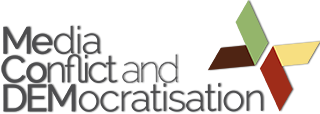A content analysis on media framing of democratisation conflicts in Egypt, Kenya, Serbia and South Africa by Nebojša Vladisavljević and Katrin Voltmer is now available!
Download at: http://www.mecodem.eu/publications/working-papers
Executive Summary
This MeCoDEM working paper presents an overview of the main findings from a quantitative content analysis covering different types of democratisation conflicts (i.e., conflicts over citizenship, elections, transitional justice and distribution of power) in four countries: Egypt, Kenya, Serbia and South Africa. The sample involves 5162 newspaper articles and news stories in the four countries selected on the basis of two main criteria: the degree of independence of media outlets from government and political parties, and their relevance. The key findings from the content analysis are organised around several themes: causes of democratisation conflicts, portrayal of conflict parties, preferred solutions to conflicts, perceptions of democracy, role of the media, authoritarian past, and tone of reporting and polarisation.
Although this paper focuses principally on description, we also speculate about the main factors that shape similarities and differences in media coverage of democratisation conflicts. The main finding from the content analysis is that cross-national variations that we found in media reporting of democratisation conflicts appear to depend on several factors:
- Our data strongly reflect specific country contexts (and contexts of broader regions from which they come from, including the Arab Middle East, sub-Saharan Africa and post-communist Europe) to be a consistent factor that shapes the pattern of media coverage, reflecting the close interdependence between media and politics. Historical and geographical influences crystallise over time into specific political, institutional and cultural legacies and thus shape media framing in different ways. For example, the army is perceived as a relevant political institution in Egypt (and much of the Middle East) – due to its dominant role in politics since independence from colonial rule – but not in other countries. However, the relationship between country context and media coverage is not a simple 1:1 reflection and multiple transformations of meaning in public discourses can tilt interpretations of political events toward unexpected directions.
- Regime type and the stage of democratisation matter when it comes to media framing of political conflicts because press freedom is an important aspect of democracy. As a result, countries that feature similar levels of democracy, or find themselves at similar points in democratisation, cluster together on several (but not all) relevant variables. Across all four countries, media’s portrayals of the achievements of democracy differ considerably with the most negative reporting recorded in South Africa and the most positive in Serbia. This finding is puzzling because these two countries can be seen as the two most advanced democracies in our sample. Factors that contribute to a positive evaluation of democracy are peaceful elections, the rule of law and economic growth, whereas institutional deficiencies, social inequalities and limited citizenship undermine beliefs in democratic governance.
- In addition, media reporting also varied depending on types of democratisation conflict – which reflect the main arenas of political contestation – though less so than on country contexts. Our data show that elections, as a highly institutionalised type of conflict (though it also probably depends on regime type/situation), were covered somewhat differently than other conflict types. Across all countries, the quality of media coverage is limited by bias, emotionalisation and – most importantly – polarisation.
In particular, conflicts over the control of power trigger sharp polarisation, whereas elections – contrary to existing literature – seem to force media towards a more restrained style of reporting. Further research, which draws on other sources, including the qualitative analysis of media content, interviews with journalists, civil society and political actors, as well as document analysis, is required to explain how exactly and why all these factors shape media coverage of democratisation conflicts.
